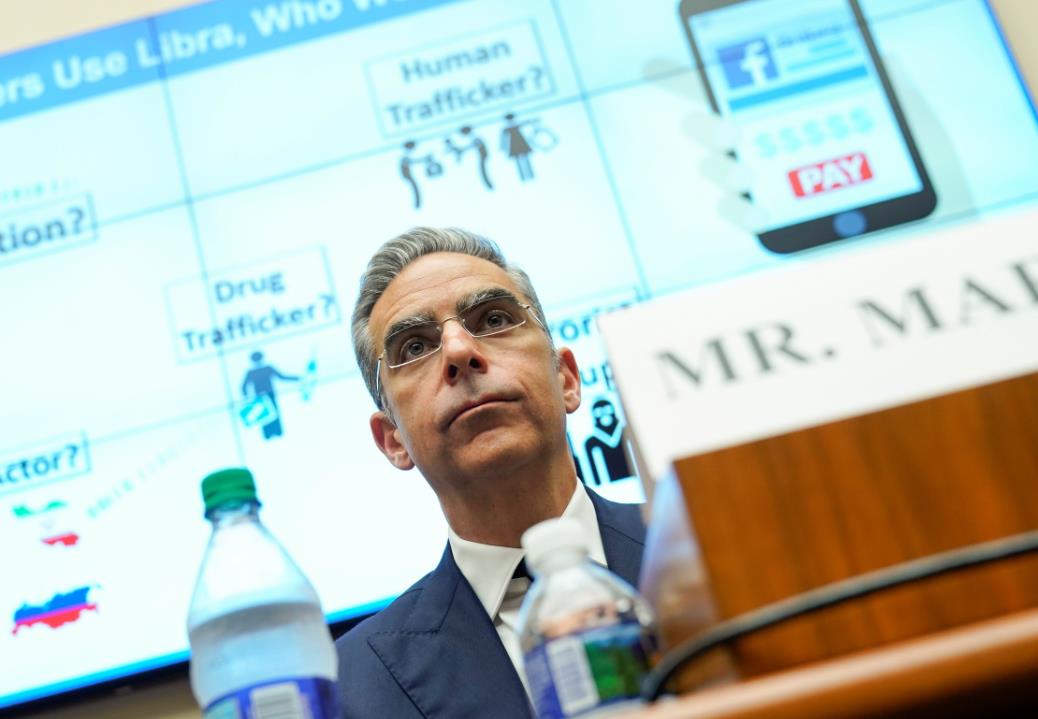Cryptocurrency plan faces opposition


Concerns over Facebook's proposal include privacy, money laundering, consumer protection and financial stability
Strong opposition to Facebook's digital currency proposal may raise barriers for its launch, as financial regulators of major economies have called it a threat to fiat currencies.
Worldwide discussion has not stopped since the emergence of digital currency. Talks became even more heated after Facebook announced plans on June 18 to launch a global digital currency called Libra.
Since July, Chinese financial regulators and experts have joined the discussion.
"We are looking at it," said Zhou Xuedong, a spokesman for the People's Bank of China, the central bank, at a recent news conference.
Zhou Xiaochuan, the former governor of the central bank, has long been aware of potential challenges to the Chinese fiat currency, the renminbi. While in office, Zhou helped to promote the RMB as a global currency for trade, investment and reserves.
Like central bankers in other major economies, Zhou's concerns come from Libra's special features that go beyond those of a general cryptocurrency. Unlike Bitcoin, Libra is described in a Facebook white paper as a currency "fully backed by a reserve of real assets". A basket of bank deposits and short-term government securities will be held in the Libra Reserve to guarantee its value.
Backed by a real reserve and pegged to a basket of major currencies, Libra could become a "hard currency" circulating worldwide, even though it is too early to say if the new digital currency will be successful, Zhou said.
A hard currency such as the US dollar usually has a relatively stable value and strong purchasing power, and investors prefer to hold it to prevent exchange rate risks. Weaker currencies generally face higher risks of capital outflows and unstable exchange rates.
There is a possibility that Libra can be freely exchanged with major fiat currencies in the future, said Zhou, who has noticed that in recent years, many institutions are competing to create global digital currencies.
This can lead to another problem - a stronger currency will erode weaker ones, and denominate the global currency system. Libra could bring challenges for cross-border payments and foreign exchange management, according to Zhou. "We should prepare for that, and make the RMB a hard currency."
Facebook's white paper hints at greater ambitions for Libra with one association described as "a governing entity that is comprised of diverse, independent and not-for-profit members, headquartered in Geneva, Switzerland".
This may indicate a desire for Libra to become a global and unified digital currency. If Libra becomes a new global payment instrument, with no national boundary, it will participate in the internationalization competition with other legal tenders, Sheng Songcheng, a former central bank official, wrote in an article recently.
As yet, Libra has no centralized regulatory mechanism. "So it is doubtful that Libra's value can remain stable," said Sheng.
However, Libra could be an instrument allowing institutions to move remittances or foreign exchange across borders more quickly and cheaply than the legacy correspondent banking system, said Sheng. "Using blockchain technology, Libra can enable clients to transfer funds peer-to-peer and directly to mobile wallets globally, which may intensify fluctuations of cross-border capital flows."
Central bank spokesman Zhou said: "In China, the only legal tender is the RMB." No cryptocurrency can have the same functions as the authorized currency RMB in China, and any cryptocurrency should be regulated, especially for anti-money laundering and counterterrorist financing, to protect personal information, he added.
Concerns are mounting among global financial regulators and politicians.
US President Donald Trump said in a series of tweets recently that cryptocurrencies, including bitcoin, are "not money" and may facilitate illegal activity. "If Facebook and other companies want to become a bank, they must seek a new banking charter and become subject to all banking regulations, just like other banks, both national and international."
The project "raises many serious concerns regarding privacy, money laundering, consumer protection and financial stability", Jay Powell, the chairman of the US Federal Reserve, was quoted as saying by the Financial Times.
At a White House news conference on July 15, the US Treasury Secretary Steven Mnuchin also expressed his concern about the potential consequences if Libra becomes widely used. He said Libra might be misused by money launderers and terrorist financiers.
Libra's co-creator David Marcus, who is in charge of Calibra - a digital wallet operated by a Facebook subsidiary - defended the plan in a written statement for the Congress hearing on July 16. "The Libra Association, which will manage the reserve, has no intention of competing with any sovereign currencies or entering the monetary policy arena," Marcus said.
Currently, Libra is facing queries from financial regulators, not only in the US but also from other countries. Persuading the regulators is a key challenge for Facebook successfully launching the new currency, according to a report from Chinese brokerage Guosheng Securities.




































